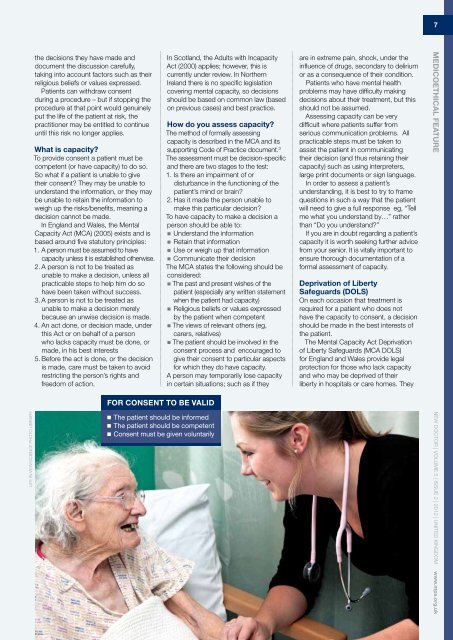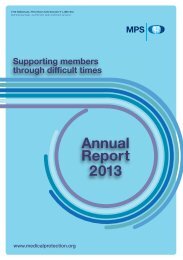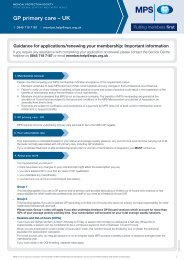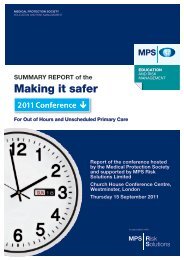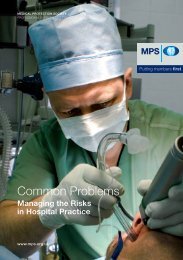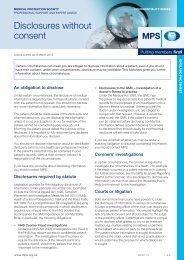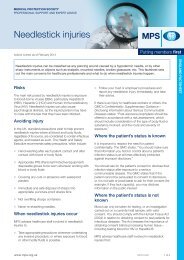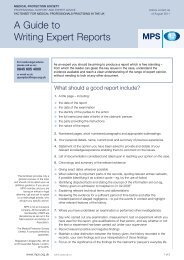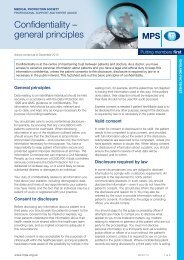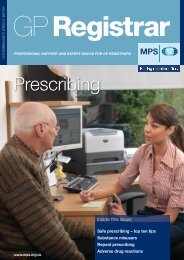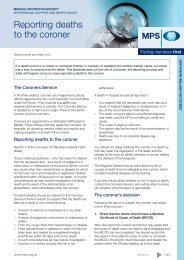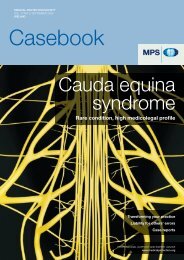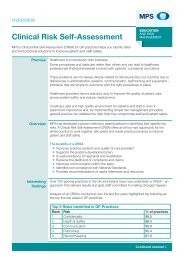New Doctor - Medical Protection Society
New Doctor - Medical Protection Society
New Doctor - Medical Protection Society
Create successful ePaper yourself
Turn your PDF publications into a flip-book with our unique Google optimized e-Paper software.
LIFE IN VIEW/SCIENCE PHOTO LIBRARY<br />
the decisions they have made and<br />
document the discussion carefully,<br />
taking into account factors such as their<br />
religious beliefs or values expressed.<br />
Patients can withdraw consent<br />
during a procedure – but if stopping the<br />
procedure at that point would genuinely<br />
put the life of the patient at risk, the<br />
practitioner may be entitled to continue<br />
until this risk no longer applies.<br />
What is capacity?<br />
To provide consent a patient must be<br />
competent (or have capacity) to do so.<br />
So what if a patient is unable to give<br />
their consent? They may be unable to<br />
understand the information, or they may<br />
be unable to retain the information to<br />
weigh up the risks/benefits, meaning a<br />
decision cannot be made.<br />
In England and Wales, the Mental<br />
Capacity Act (MCA) (2005) exists and is<br />
based around five statutory principles:<br />
1. A person must be assumed to have<br />
capacity unless it is established otherwise.<br />
2. A person is not to be treated as<br />
unable to make a decision, unless all<br />
practicable steps to help him do so<br />
have been taken without success.<br />
3. A person is not to be treated as<br />
unable to make a decision merely<br />
because an unwise decision is made.<br />
4. An act done, or decision made, under<br />
this Act or on behalf of a person<br />
who lacks capacity must be done, or<br />
made, in his best interests<br />
5. Before the act is done, or the decision<br />
is made, care must be taken to avoid<br />
restricting the person’s rights and<br />
freedom of action.<br />
In Scotland, the Adults with Incapacity<br />
Act (2000) applies; however, this is<br />
currently under review. In Northern<br />
Ireland there is no specific legislation<br />
covering mental capacity, so decisions<br />
should be based on common law (based<br />
on previous cases) and best practice.<br />
How do you assess capacity?<br />
The method of formally assessing<br />
capacity is described in the MCA and its<br />
supporting Code of Practice document. 3<br />
The assessment must be decision-specific<br />
and there are two stages to the test:<br />
1. Is there an impairment of or<br />
disturbance in the functioning of the<br />
patient’s mind or brain?<br />
2. Has it made the person unable to<br />
make this particular decision?<br />
To have capacity to make a decision a<br />
person should be able to:<br />
■ ■ Understand the information<br />
■ ■ Retain that information<br />
■ ■ Use or weigh up that information<br />
■ ■ Communicate their decision<br />
The MCA states the following should be<br />
considered:<br />
■ ■The<br />
past and present wishes of the<br />
patient (especially any written statement<br />
when the patient had capacity)<br />
■ ■ Religious beliefs or values expressed<br />
by the patient when competent<br />
■ ■The<br />
views of relevant others (eg,<br />
carers, relatives)<br />
FOR CONSENT TO BE VALID<br />
■ ■ The patient should be informed<br />
■ ■ The patient should be competent<br />
■ ■ Consent must be given voluntarily<br />
■ ■The<br />
patient should be involved in the<br />
consent process and encouraged to<br />
give their consent to particular aspects<br />
for which they do have capacity.<br />
A person may temporarily lose capacity<br />
in certain situations; such as if they<br />
are in extreme pain, shock, under the<br />
influence of drugs, secondary to delirium<br />
or as a consequence of their condition.<br />
Patients who have mental health<br />
problems may have difficulty making<br />
decisions about their treatment, but this<br />
should not be assumed.<br />
Assessing capacity can be very<br />
difficult where patients suffer from<br />
serious communication problems. All<br />
practicable steps must be taken to<br />
assist the patient in communicating<br />
their decision (and thus retaining their<br />
capacity) such as using interpreters,<br />
large print documents or sign language.<br />
In order to assess a patient’s<br />
understanding, it is best to try to frame<br />
questions in such a way that the patient<br />
will need to give a full response eg, “Tell<br />
me what you understand by…” rather<br />
than “Do you understand?”<br />
If you are in doubt regarding a patient’s<br />
capacity it is worth seeking further advice<br />
from your senior. It is vitally important to<br />
ensure thorough documentation of a<br />
formal assessment of capacity.<br />
Deprivation of Liberty<br />
Safeguards (DOLS)<br />
On each occasion that treatment is<br />
required for a patient who does not<br />
have the capacity to consent, a decision<br />
should be made in the best interests of<br />
the patient.<br />
The Mental Capacity Act Deprivation<br />
of Liberty Safeguards (MCA DOLS)<br />
for England and Wales provide legal<br />
protection for those who lack capacity<br />
and who may be deprived of their<br />
liberty in hospitals or care homes. They<br />
7<br />
MEDICOETHICAL FEATURE<br />
NEW DOCTOR | VOLUME 5 | ISSUE 2 | 2012 | UNITED KINGDOM www.mps.org.uk


